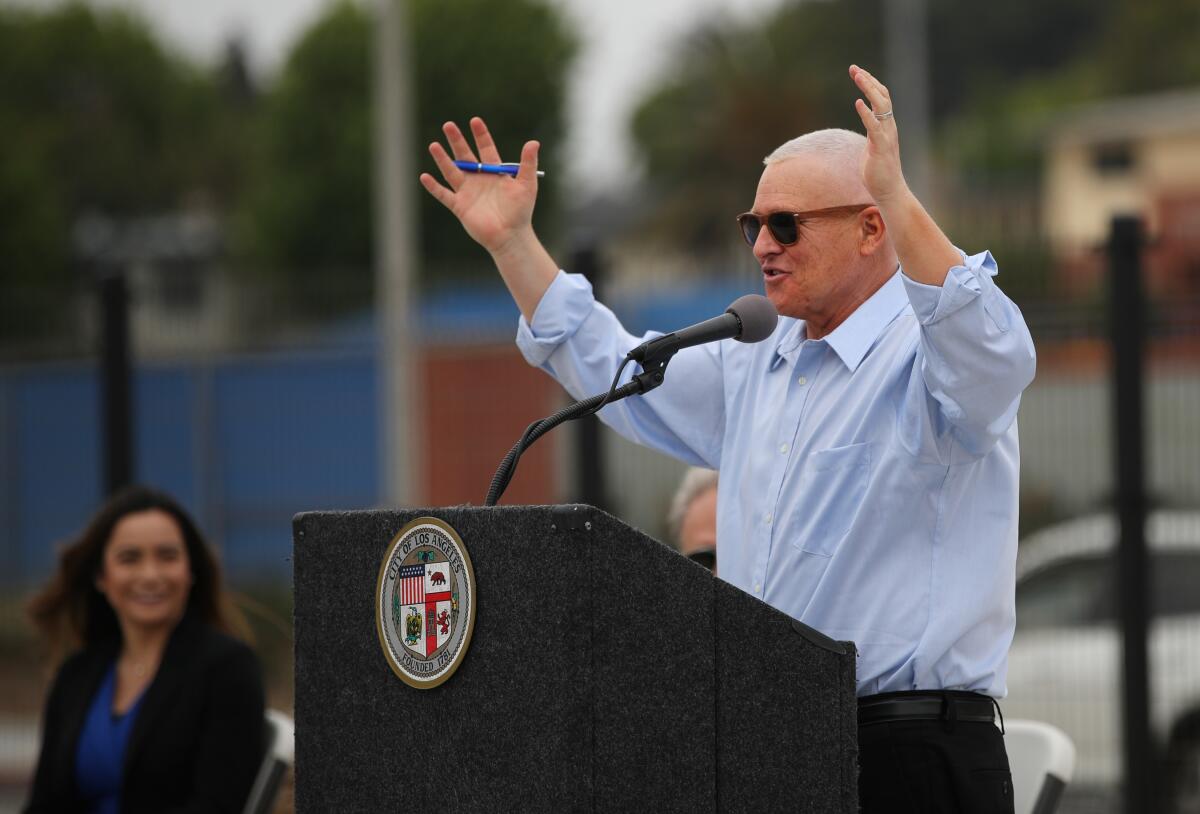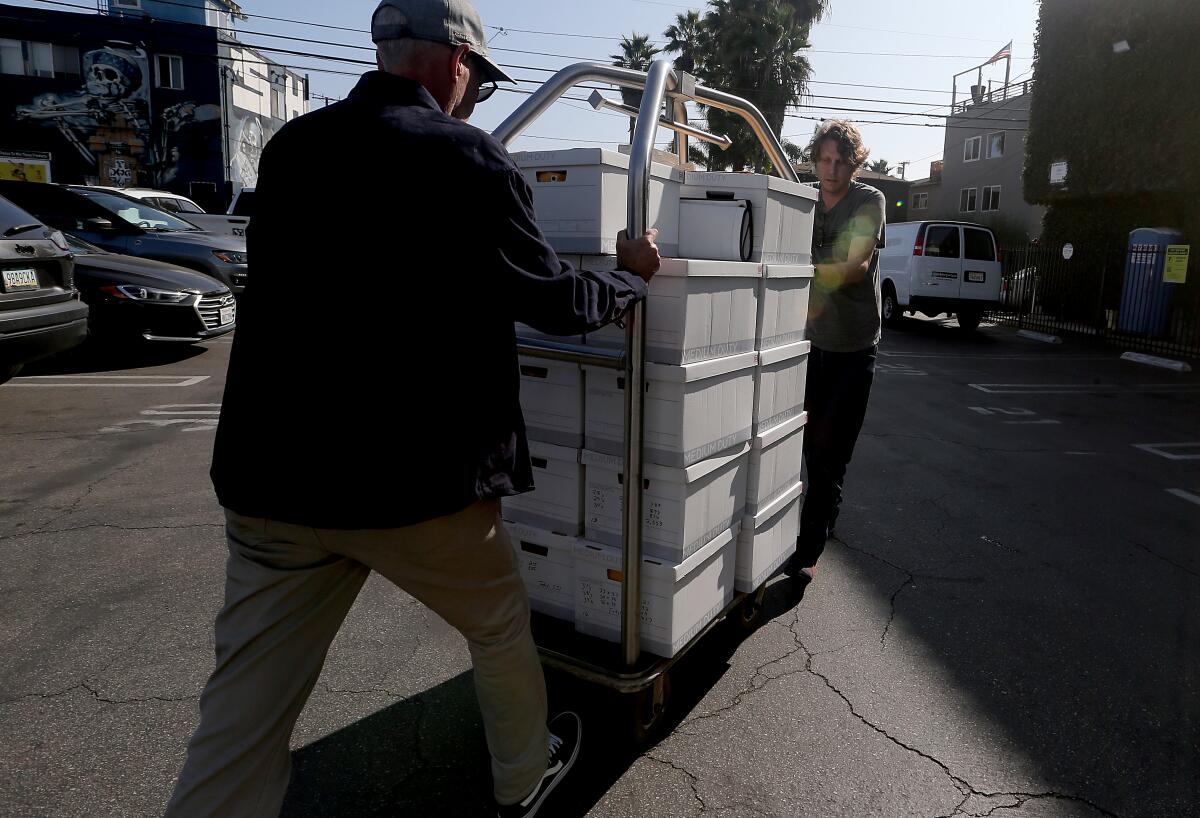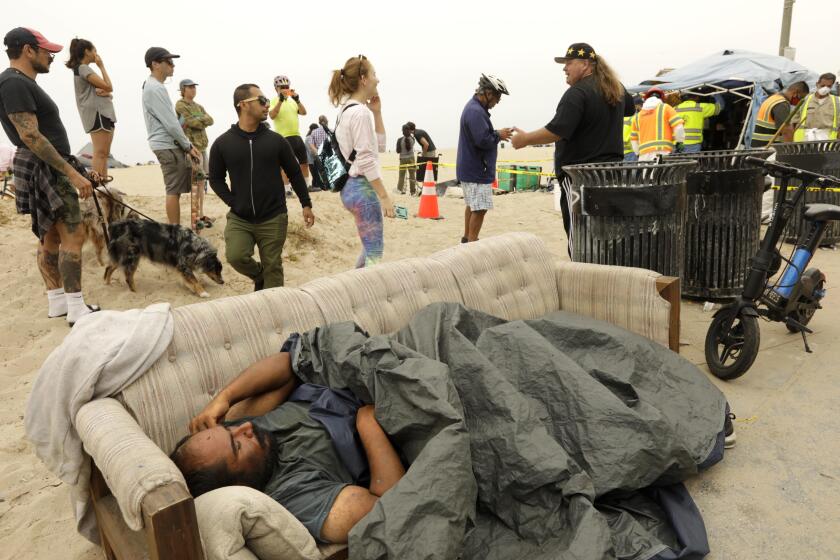Group says it has enough signatures to force L.A. Councilman Mike Bonin recall vote

- Share via
A group looking to oust Los Angeles City Councilman Mike Bonin said Wednesday it has submitted more than 39,000 signatures in support of its recall measure — a number proponents believe is enough to qualify for the ballot.
Under the city’s election rules, the Recall Bonin 2021 campaign must turn in more than 27,000 valid signatures from registered voters in Bonin’s coastal district, which stretches from Los Angeles International Airport north to Pacific Palisades. The city clerk will determine in the coming weeks whether those petitions have enough signatures to trigger a special recall election.
Katrina Schmitt, a recall proponent who lives in Venice, said the large number of signatures shows that voters in Bonin’s district have run out of patience with homelessness, crime and a lack of responsiveness from the councilman’s office. To have so many signatures, she said, “sends a strong message about what we want.”
“We want him gone. We want him out. This is the official process to fire someone,” she said.
The recall effort is the most potent sign yet of public dissatisfaction over the homelessness crisis in L.A. In public meetings, residents and business owners have become more outspoken in demanding a more rapid response to the humanitarian crisis, which has reached nearly every corner of the city.
Council members have been focusing on opening up “tiny home” villages, setting up overnight camping sites and using motel and hotel rooms as temporary shelter. But many of their strategies are contested terrain.
Several council members have begun establishing no-camping zones at parks, schools, day-care centers and freeway overpasses. Bonin has sought to block those efforts, saying such prohibitions push unhoused residents from one block to the next, voting against plans from his colleagues to set up such zones in their districts.
Recall backers said Wednesday that Bonin has not taken seriously incidents of theft, drug dealing and violent crime in his district that they say are directly connected to encampments. Bonin, in turn, called on his allies to help him defeat the recall, describing the campaign as a “choice about how we respond to homelessness.”
“It’s a choice between housing and services, which work, or criminalization, which fails,” he said. “It’s a choice between helping people off the street, or wasting money pushing them from neighborhood to neighborhood.”
Bonin has touted his work in his district moving people off the street and into motel rooms or permanent housing — a program he calls Encampment to Homes. By contrast, he said, recall backers have fought his efforts to open new homeless facilities.
Bonin’s spokesman at City Hall, David Graham-Caso, has also assailed recall backers, saying on social media that his boss’ strategies for addressing homelessness “aren’t cruel enough for the people behind the recall effort.”
“This is a coalition of liars, frauds and bigots trying to stifle progress,” Graham-Caso wrote earlier this year on his personal Twitter account.
As the deadline for turning in signatures approached, Bonin’s anti-recall committee took steps to portray the recall as a movement driven by right-wing forces. Recall backers have disputed that assertion, saying residents who want to remove the councilman run across the political spectrum.
Allison Holdorff Polhill, who is challenging Bonin in next year’s regularly scheduled city election, said she is a Democrat who opposed the recall of Gov. Gavin Newsom. Polhill recently signed the Bonin recall petition, saying she views this campaign as “a completely different situation.”

Polhill, who works for Los Angeles school board member Nick Melvoin, said children whose schools are next to encampments have witnessed fights and seen people on the street exposing themselves. At one campus in Bonin’s district, dozens of used needles were found next to an exterior fence, she said.
“Every day there is a health and safety issue for our kids,” she said.
Traci Park, an attorney who is also running against Bonin, also disputed the idea that the recall is a right-wing phenomenon. People from “every political persuasion” have come together to tell Bonin that they have had enough, she said.
“There have been fires. There have been murders. Businesses are closing. People are fleeing the community. The crime is off the charts and Mike Bonin has been silent on all of it,” said Park, a Democrat who lives in Venice who gathered signatures for the recall.
Bonin, 54, was first elected in 2013, after serving several years as chief of staff to Councilman Bill Rosen-dahl. He easily secured a second term in 2017, winning reelection with 31,865 votes, or 71%.
The last time a recall campaign at City Hall qualified for the ballot was in 1984, according to City Archivist Michael Holland. That year, Councilman Art Snyder succeeded in defeating the recall effort, only to announce five months later he would be stepping down.
L.A. voters have not recalled an elected official at City Hall in 75 years, Holland said. The last successful effort took place in 1946, when Councilman Meade McClanahan was forced from office, he said.
If the Bonin recall qualifies for the ballot, the timing will be highly unusual. He is already running in the June city election for a third and final term representing a district that includes Westchester, Playa del Rey, Venice, Mar Vista and Brentwood.
City Clerk Holly Wolcott said her office’s “best earliest assumption” at this point is that — assuming there are enough valid signatures — a recall election would occur in May. That would be one month before Bonin is expected to appear on the city’s regular election ballot.
After a month of intensive outreach, most homeless campers have been removed from the Venice boardwalk and given shelter, if only temporarily.
Wolcott said her office will conduct an initial review process, which typically takes up to two weeks, to determine whether there are enough signatures to initiate a signature review phase. After that, she said, her office would have 30 business days to verify every signature.
Any special election ballot, Wolcott said, would feature not just a question about the recall but a list of replacement candidates.
Even if the anti-Bonin group falls short of the required signatures, its effort is already proving to be an outlier.
Recall drives at City Hall usually fizzle out well before the deadline for submitting signatures. In recent years, activists have tried without success to recall an array of politicians, including Mayor Eric Garcetti, Councilman Paul Krekorian, former Councilman Jack Weiss and, most recently, Councilwoman Nithya Raman.
With city officials set to begin examining the recall petitions on Friday, it’s too soon to say how the attempt to remove Bonin will play out. Nevertheless, the odd timing of the upcoming campaigns leaves the door open to some strange election scenarios.
For example, if the measure qualifies and voters succeed in recalling Bonin in May, he would be removed from office and replaced by someone else. However, neither of those events would prevent him from appearing on the ballot in the June primary weeks later.
If Bonin secures a majority of the vote in June, he would win a third term. If no one gets 50% but Bonin makes the top two, he would still have the opportunity to win in November.
More to Read
Sign up for Essential California
The most important California stories and recommendations in your inbox every morning.
You may occasionally receive promotional content from the Los Angeles Times.












